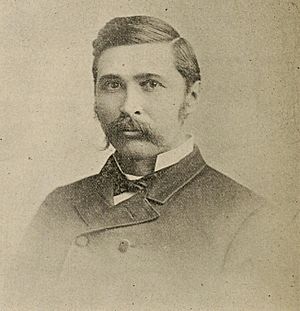William Wellington Corlett facts for kids
Quick facts for kids
William W. Corlett
|
|
|---|---|
 |
|
| Member of the U.S. House of Representatives from Wyoming Territory's at-large district |
|
| In office March 4, 1877 – March 3, 1879 (Delegate) |
|
| Preceded by | William Randolph Steele |
| Succeeded by | Stephen Wheeler Downey |
| Personal details | |
| Born | April 10, 1842 Concord, Ohio |
| Died | July 22, 1890 (aged 48) Cheyenne, Wyoming |
| Political party | Republican |
| Alma mater | University of Michigan Union Law College |
| Military service | |
| Allegiance | |
| Branch/service | Union Army |
| Battles/wars | Civil War |
William Wellington Corlett (born April 10, 1842 – died July 22, 1890) was an important American lawyer and politician. He served as a Delegate for the Wyoming Territory in the United States Congress. A Delegate is like a representative for a territory that isn't yet a state. Corlett played a key role in the early history of Wyoming.
Contents
Early Life and Education
William W. Corlett was born on April 10, 1842, in Concord, Ohio. He went to local schools in his area. Later, he graduated from the Willoughby Collegiate Institute in Ohio in 1861. This was an important step in his education.
Service in the Civil War
When the American Civil War began, Corlett joined the Union Army in 1862. He served in two different Ohio infantry regiments. An infantry regiment is a military unit made up of soldiers who fight on foot.
During his service, he was captured by the enemy. This happened at the Battle of Harpers Ferry on September 15, 1862. After being captured, he was later released.
After the War
After being released, Corlett returned to Ohio. For a time, he worked as a teacher in Kirkland and Painesville. He then rejoined the army. He served with the Twenty-fifth Ohio Battery and later with the Third Iowa Battery. A "battery" is a military unit that uses artillery, like cannons. He left the army for good in 1865.
Becoming a Lawyer
After his military service, William Corlett decided to study law. He attended the University of Michigan in Ann Arbor. He also graduated from Union Law College in Cleveland, Ohio in July 1866.
That same year, he passed his exams to become a lawyer. This meant he was "admitted to the bar." He even taught law at the State University and Law College in Cleveland. He also gave lectures at several business schools.
Moving to Wyoming
In 1867, Corlett moved to Cheyenne, Wyoming. There, he started his own law practice. For some time, his law partner was John Alden Riner. Riner later became a federal judge.
Corlett tried to become a Delegate to Congress in 1869. He ran as a Republican candidate but did not win that election.
Political Career in Wyoming
William Corlett held several important jobs in Wyoming. In 1870, he was the Postmaster of Cheyenne. The Postmaster is in charge of the local post office.
In 1871, he became a member of the Territorial Senate. This was like the state legislature for the Wyoming Territory. From 1872 to 1876, he served as the prosecuting attorney for Laramie County. A prosecuting attorney is a lawyer who represents the government in criminal cases.
Delegate to Congress
In 1877, Corlett was elected as a Republican Delegate to the Forty-fifth Congress. He served from March 4, 1877, to March 3, 1879. As a Delegate, he represented the people of Wyoming Territory in Washington, D.C.
He did not run for re-election in 1878. After his time in Congress, he went back to practicing law. In 1879, he was offered the job of chief justice for Wyoming Territory, but he turned it down. He continued to serve in the legislative council from 1880 to 1882.
Later Life and Legacy
William W. Corlett passed away in Cheyenne, Wyoming, on July 22, 1890. He was buried in Lakeview Cemetery. He is remembered for his service during the Civil War and his important contributions to the early government of Wyoming Territory.

